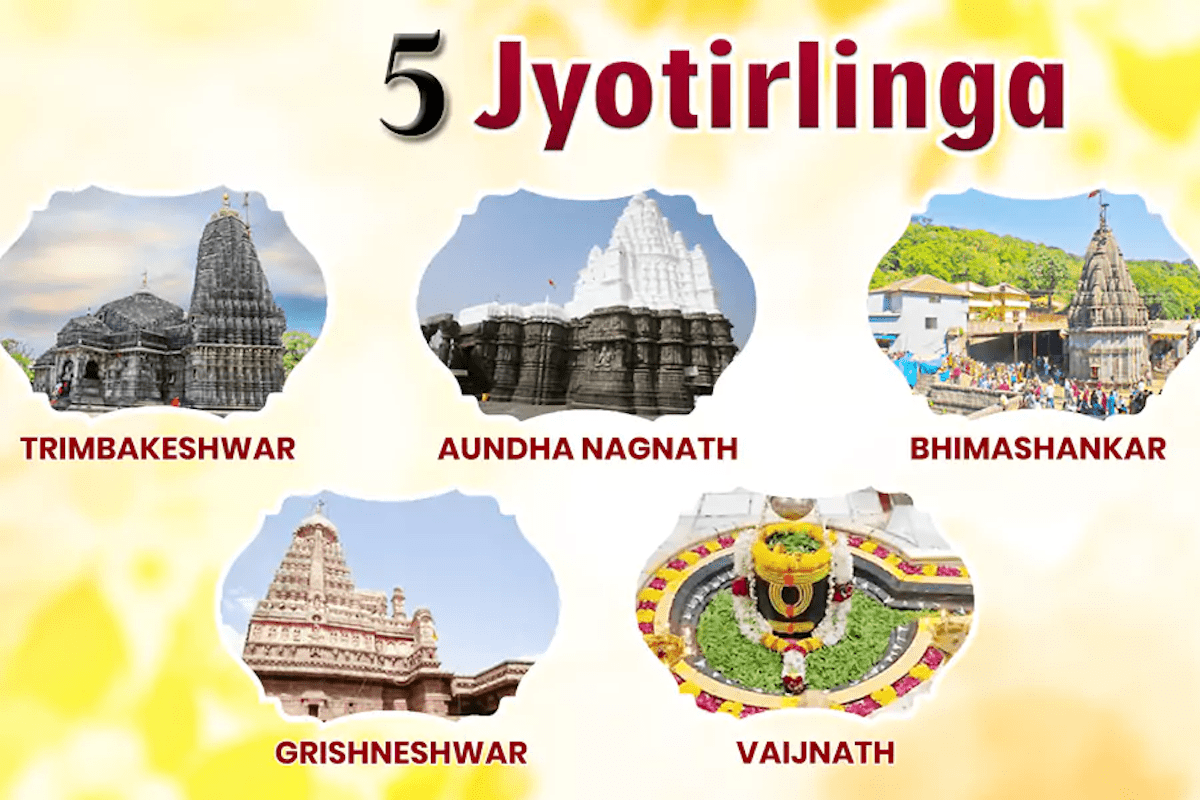Maharashtra is home to 5 of the 12 Jyotirlinga temples in India, making it a key destination for devotees seeking blessings at these most sacred abodes of Lord Shiva. Jyotirlingas hold profound religious significance in Hinduism as the supreme manifestation of the divine.
A pilgrimage through the Jyotirlinga shrines across Maharashtra offers more than just spiritual fulfillment. It provides a lens into fascinating mythology, royal histories, vibrant cultures, and breath-taking temple architecture of the land.
Table of Contents
What Are Jyotirlingas and Why Are They Significant?
As per Hindu scriptures, a Jyotirlinga is a devotional representation of Lord Shiva that appears as a pillar of light. Each Jyotirlinga temple is considered a living embodiment of the divine rather than just a holy place.
The worship of the 12 Jyotirlingas across India stretches back centuries, with legends and hymns celebrating their spiritual powers. Visiting these shrines is believed to hold very special significance for devotees of Shiva.
Maharashtra’s Rich Legacy of Jyotirlinga Temples
Maharashtra has the highest number of Jyotirlinga shrines among all Indian states. Pilgrims have flocked to offer prayers at these temples for generations.
The Jyotirlingas of Maharashtra include:
- Bhimashankar Temple
- Trimbakeshwar Temple
- Grishneshwar Temple
- Parli Vaijnath Temple
- Aundha Nagnath Temple
These temples are located in different parts of Maharashtra and have their own uniquely inspiring legends and structures. Besides religious meaning, they also offer insights into the state’s history, architecture and culture.
Bhimashankar Temple – Where Shiva Destroyed Tripurasura
Bhimashankar Temple is located near Pune, set beautifully against the Sahyadri hills. As per legend, this is the site where Lord Shiva used his bow Pinaka to destroy the demon Tripurasura.
The current Bhimashankar temple dates back to the 18th century. The shikhara towers over the sanctum sanctorum in classic Hemadpanti architectural style with carved stone blocks. Intricate wooden carvings and copper plates adorn the inside walls.
Bhimashankar is also the source of the Bhima river, one of the important lifelines in the region. The river appears miraculously from inside the shrine before flowing down the hills.
Key Details of Bhimashankar Jyotirlinga Temple
| Temple | Bhimashankar |
|---|---|
| Location | Pune District |
| Architectural Style | Hemadpanti |
| Primary Deity | Bhimashankar Shiva Lingam |
| Best Time to Visit | Shravan (July/Aug) for Nag Panchami festival |
The serene forested environs of Bhimashankar make it perfect for a monsoon getaway. Do also visit the nearby ancient Shiva cave temple on the way.
Trimbakeshwar – One of the Holiest Pilgrimage Places in India
Trimbakeshwar Temple near Nasik is revered as one of the most sacred abodes of Lord Shiva outside the Himalayas. The extraordinary Jyotirlingam here is one of the twelve shrines described in the Shiva Purana.
The temple complex features exquisite stone carvings, wall paintings and a majestic shikhara towering over the sanctum. A perennial stream of water oozes out from inside the lingam in a natural spring.
Trimbakeshwar is closely associated with the origin myth of Godavari – India’s second longest river. The waters of the Godavari first emerged out of a cow’s mouth at this very spot after being struck by Shiva’s trident.
Key Details of Trimbakeshwar Jyotirlinga Temple
| Temple | Trimbakeshwar |
|---|---|
| Location | Nashik District |
| Architectural Style | Classic Brahminical |
| Primary Deity | Trimbakeshwar Jyotirlingam |
| Best Time to Visit | Shravan Month for Nag Panchami & Maha Shivratri |
Plan your visit during Shravan to join the grand processions and celebrations of Nag Panchami.
Grishneshwar – The Southernmost Jyotirlinga
The Grishneshwar Jyotirlinga temple is located at a village called Verul close to Aurangabad. As the southernmost Jyotirlinga, it attracts huge crowds of devotees all year round.
Grishneshwar stands as one of the oldest temple complexes in the region. Inscriptions date parts of the temple to the 12th century Kalyani Chalukya period. The architecture is a fusion of Dravidian and north Indian styles. Intricately carved pillars line the entrance mandapa.
Inside the inner sanctum, the Jyotirlingam is enshrined on a square platform with a small water channel surrounding it. The lingam displays a unique mark that resembles the crescent moon.
Key Details of Grishneshwar Jyotirlinga Temple
| Temple | Grishneshwar |
|---|---|
| Location | Aurangabad District |
| Architectural Style | Chalukyan Fusion |
| Primary Deity | Grishneswar Jyotirlingam |
| Best Time to Visit | Maha Shivaratri Festival |
Plan your travel during Maha Shivaratri when Grishneshwar comes alive with thousands of dancing devotees and special pujas through the night.
Parli Vaijnath – Where Shiva Consumed the Poison
According to mythology, Parli Vaijnath temple marks the site where Lord Shiva consumed poison that emerged from the cosmic ocean during the Sagar Manthan episode. Here he is worshipped as Vaijnath, the lord of physicians.
The temple complex houses several shrines, but the Uma Maheshwar idol is the main attraction. This rare image depicts Shiva and Parvati on Nandi – the sacred bull. Intricately carved on black stone, it draws in thousands of devotees.
The temple architecture represents an amalgamation of early Hindu, Buddhist and Jain styles. The garbhagriha and sabhamandapa stand out for their delicate carvings.
Key Details of Parli Vaijnath Jyotirlinga Temple
| Temple | Parli Vaijnath |
|---|---|
| Location | Beed District |
| Architectural Style | Ancient Hindu-Buddhist-Jain Fusion |
| Primary Deity | Vaijnath Shiva Lingam |
| Best Time to Visit | Shravan Somwar for Kalashtami Celebrations |
Visiting during Shravan is ideal to receive blessings on Somwar days and join the vibrant Kalashtami festival.
Aundha Nagnath – The Basilica of Jyotirlingas
The Aundha Nagnath temple in Hingoli district stands out as one of the most architecturally magnificent Jyotirlinga basilicas. As per local legends, this is where Shiva first manifested himself in the Jyotirlinga form.
The temple displays a stunning blend of Hemadpanti, south Indian Dravidian, Solanki and Yadava architectural influences. The intricate stone carvings on the sabhamandapa pillars depict the various forms of Shiva.
Inside the main shrine, the swayambhu lingam displays a natural buffalo horn mark on its top. Water constantly flows from the lingam in a natural spring.
Key Details of Aundha Nagnath Jyotirlinga Temple
| Temple | Aundha Nagnath |
|---|---|
| Location | Hingoli District |
| Architectural Style | Architectural Fusion |
| Primary Deity | Nageshwar Jyotirlingam |
| Best Time to Visit | Shravan Maas for Special Pujas |
Experience the Divine Jyotirlinga Trail of Maharashtra
A pilgrimage to the Jyotirlinga temples lets you discover Maharashtra’s glorious spiritual traditions, admire its magnificent temple architecture and experience divine vibrations.
Each temple has its own legend and unique rituals to offer a personal brush with the divine. The beautiful natural settings add to the soul-stirring experience for devotees.
While Shravan month sees the highest pilgrim footfall, winters are best for comfortable travel. Comfortable clothing, sturdy shoes, umbrella/hats and sunscreen are must-haves. Carry prasad offerings like coconuts, flowers, sweets, etc.
Observe sanctity, dress modestly and respect local traditions for the most meaningful journey. Travel in groups and use authorized guides when possible. Proper advance booking for transport and hotels ensures a smooth darshan.
Here are some key tips to help plan your pilgrimage:
Tips for Visiting Jyotirlinga Temples of Maharashtra
| Temple | Best Time for Visit | Key Tips |
|---|---|---|
| Bhimashankar | July-August | Carry woolens due to hill weather even in summer |
| Trimbakeshwar | July-August | Hire authorized pandas for rituals |
| Grishneshwar | February-March | Book A/c transport due to heat |
| Parli Vaijnath | July-August | Carry prasad for Somwar puja |
| Aundha Nagnath | July-August | Avoid monsoon due to bad roads |
With divine blessings, proper planning and wise precautions, a journey through Maharashtra’s Jyotirlinga temples will remain etched in your memory for a lifetime.
References
I hope you like reading article on Top Jyotirlinga Temples in Maharashtra Every Tourist Should Visit.

Chirag Sachdeva is a seasoned digital marketing expert with over 15 years of experience spanning digital strategy, content management, and SEO. Chirag is the founder of Digifly Technology, where he empowers businesses to grow through innovative digital solutions. With a deep understanding of content strategy and market trends.
Related posts:
 Aditya Thackeray vs Milind Deora- A Close Contest in Worli Constituency Assembly
Aditya Thackeray vs Milind Deora- A Close Contest in Worli Constituency Assembly
 Maharashtra 2024 -District wise List of Parliamentary Constituencies
Maharashtra 2024 -District wise List of Parliamentary Constituencies
 How to Register for Maharashtra 7/12 Satbara Utara Online- Step by step Guide
How to Register for Maharashtra 7/12 Satbara Utara Online- Step by step Guide
 How to Get a Police Verification Certificate in Maharashtra in 2024- A Complete Guide
How to Get a Police Verification Certificate in Maharashtra in 2024- A Complete Guide
